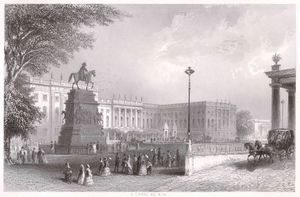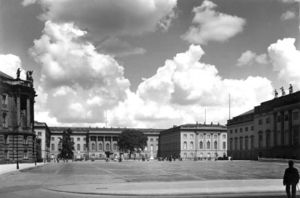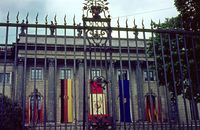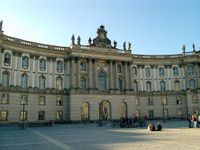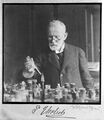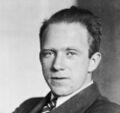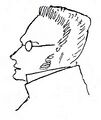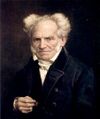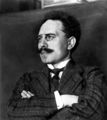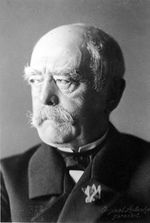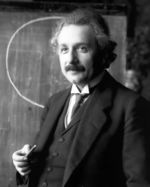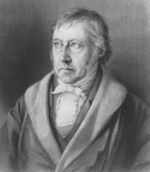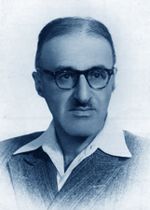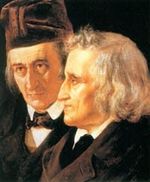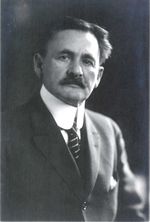جامعة هومبولت في برلين
Humboldt-Universität zu Berlin | |
 | |
| الشعار | Universitas litterarum (Latin) |
|---|---|
الشعار بالإنجليزية | The Entity of Sciences |
| النوع | Public |
| تأسست | 15 أكتوبر 1810 |
| الميزانية | €483.3 million (2020)[2] |
| الرئيس | Julia von Blumenthal |
| الطاقم الأكاديمي | 2,403[3] |
| الطاقم الإداري | 1,516[3] |
| الطلبة | 32,553[3] |
| طلبة قبل البكالوريوس | 18,712[4] |
| طلاب الدراسات العليا | 10,881[4] |
| طلاب الدكتوراه | 2,951[4] |
| الموقع | ، Germany 52°31′05″N 13°23′36″E / 52.51806°N 13.39333°E |
| الحرم | Urban and Suburban |
| Nobel Laureates | 57 (as of 2020)[5] |
| ألوان المدرسة | Blue and White [6] |
| الانتساب | German Universities Excellence Initiative UNICA U15 Atomium Culture EUA IAU FGU Erasmus |
| الموقع الإلكتروني | hu-berlin.de |
 | |
جامعة هومبولت في برلين (بالألمانية: Humboldt-Universität zu Berlin، واختصارها HU Berlin) هي أقدم جامعة في برلين، إذ تأسست في 1810 تحت اسم جامعة برلين (Universität zu Berlin) على يد المصلح التربوي الپروسي الليبرالي وعالم اللسانيات ڤيلهلم فون هومبولت، الذي بناها على نسق الجامعات الاوروبية والغربية الأخرى. ومنذ 1828 عـُرفت بإسم جامعة فردريك ڤيلهلم (ألمانية: Friedrich-Wilhelms-Universität).[7][8] During the Cold War, the university found itself in East Berlin and was de facto split in two when the Free University of Berlin opened in West Berlin. The university received its current name in honour of Alexander and Wilhelm von Humboldt in 1949.[9]
The university is divided into nine faculties including its medical school shared with the Freie Universität Berlin. The university has a student enrollment of around 32,000 students, and offers degree programs in some 189 disciplines from undergraduate to post-doctorate level.[10] Its main campus is located on the Unter den Linden boulevard in central Berlin. The university is known worldwide for pioneering the Humboldtian model of higher education, which has strongly influenced other European and Western universities.[11]
It was regarded as the world's preeminent university for the natural sciences during the 19th and early 20th century, as the university is linked to major breakthroughs in physics and other sciences by its professors, such as Albert Einstein.[12] Past and present faculty and notable alumni include 57 Nobel Prize laureates[5] (the most of any German university by a substantial margin), as well as eminent philosophers, sociologists, artists, lawyers, politicians, mathematicians, scientists, and heads of state; among them are: Albert Einstein, Hermann von Helmholtz, Emil du Bois-Reymond, Robert Koch, Theodor Mommsen, Karl Marx, Friedrich Engels, Otto von Bismarck, W. E. B. Du Bois, Angela Davis, Arthur Schopenhauer, Georg Wilhelm Friedrich Hegel, Walter Benjamin, Max Weber, Georg Simmel, Karl Liebknecht, Ernst Cassirer, Heinrich Heine, Eduard Fraenkel, Max Planck and the Brothers Grimm.
As one of Germany's most prestigious institutions of higher education, Humboldt-Universität zu Berlin has been conferred the title of "University of Excellence" under the German Universities Excellence Initiative.
. . . . . . . . . . . . . . . . . . . . . . . . . . . . . . . . . . . . . . . . . . . . . . . . . . . . . . . . . . . . . . . . . . . . . . . . . . . . . . . . . . . . . . . . . . . . . . . . . . . . . . . . . . . . . . . . . . . . . . . . . . . . . . . . . . . . . . . . . . . . . . . . . . . . . . . . . . . . . . . . . . . . . . . .
التاريخ
المبنى الرئيسي
The main building of Humboldt-Universität is the Prinz-Heinrich-Palais (English: Prince Henry's Palace) on Unter den Linden boulevard in the historic centre of Berlin. It was erected from 1748 to 1753 for Prince Henry of Prussia, the brother of Frederick the Great, according to plans by Johann Boumann in Baroque style. In 1809, the former Royal Prussian residence was converted into a university building. Damaged during the Allied bombing in World War II, it was rebuilt from 1949 to 1962.[13]
In 1967, eight statues from the destroyed Potsdam City Palace were placed on the side wings of the university building. Currently there is discussion about returning the statues to the Potsdam City Palace, which was rebuilt as the Landtag of Brandenburg in 2013.[14]
التاريخ المبكر

The University of Berlin was established on 16 August 1809, on the initiative of the liberal Prussian educational politician Wilhelm von Humboldt by King Friedrich Wilhelm III, similar to University of Bonn, during the period of the Prussian Reform Movement. The university was located in a palace constructed from 1748 to 1766[15] for the late Prince Henry, the younger brother of Frederick the Great.[16] After his widow and her ninety-member staff moved out, the first unofficial lectures were given in the building in the winter of 1809.[16] Humboldt faced great resistance to his ideas as he set up the university. He submitted his resignation to the King in April 1810, and was not present when the school opened that fall.[1] The first students were admitted on 6 October 1810, and the first semester started on 10 October 1810, with 256 students and 52 lecturers[9] in faculties of law, medicine, theology and philosophy under rector Theodor Schmalz. The university celebrates 15 October 1810 as the date of its opening.[1] In 1810, at the time of the opening, the university established the first academic chair in the field of history in the world.[17] From 1828 to 1945, the school was named the Friedrich Wilhelm University, in honor of its founder. Ludwig Feuerbach, then one of the students, made a comment on the university in 1826: "There is no question here of drinking, duelling and pleasant communal outings; in no other university can you find such a passion for work, such an interest for things that are not petty student intrigues, such an inclination for the sciences, such calm and such silence. Compared to this temple of work, the other universities appear like public houses."[18]
The university has been home to many of Germany's greatest thinkers of the past two centuries, among them the subjective idealist philosopher Johann Gottlieb Fichte, the theologian Friedrich Schleiermacher, the absolute idealist philosopher G.W.F. Hegel, the Romantic legal theorist Friedrich Carl von Savigny, the anti-optimist philosopher Arthur Schopenhauer, the objective idealist philosopher Friedrich Schelling, cultural critic Walter Benjamin, and famous physicists Albert Einstein and Max Planck.
التوسعة
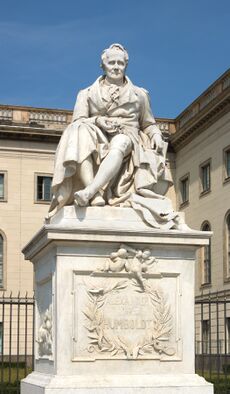
In addition to the strong anchoring of traditional subjects, such as science, law, philosophy, history, theology and medicine, the university developed to encompass numerous new scientific disciplines. Alexander von Humboldt, brother of the founder William, promoted the new learning. The construction of modern research facilities in the second half of the 19th century aided the teaching of the natural sciences. Famous researchers, such as the chemist August Wilhelm Hofmann, the physicist Hermann von Helmholtz, the mathematicians Ernst Eduard Kummer, Leopold Kronecker, Karl Weierstrass, the physicians Johannes Peter Müller, Emil du Bois-Reymond, Albrecht von Graefe, Rudolf Virchow, and Robert Koch, contributed to Berlin University's scientific fame.
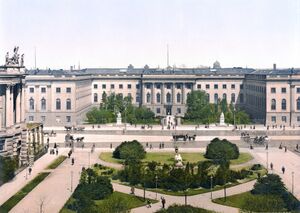
الرايخ الثالث
After 1933, like all German universities, Friedrich Wilhelm University was affected by the Nazi regime. The rector during this period was Eugen Fischer. It was from the university's library that some 20,000 books by "degenerates" and opponents of the regime were taken to be burned on 10 May of that year in the Opernplatz (now the Bebelplatz) for a demonstration protected by the SA that also featured a speech by Joseph Goebbels. A monument to this can now be found in the center of the square, consisting of a glass panel opening onto an underground white room with empty shelf space for 20,000 volumes and a plaque, bearing an epigraph from an 1820 work by Heinrich Heine: "Das war ein Vorspiel nur, dort wo man Bücher verbrennt, verbrennt man am Ende auch Menschen" ("This was but a prelude; where they burn books, they ultimately burn people").
The Law for the Restoration of the Professional Civil Service (German "Gesetz zur Wiederherstellung des Berufsbeamtentums") resulted in 250 Jewish professors and employees being fired from Friedrich Wilhelm University during 1933–1934 and numerous doctorates being withdrawn. Students and scholars and political opponents of Nazis were ejected from the university and often deported. During this time nearly one third of all of the staff were fired by the Nazis.
الحرب الباردة
ألمانيا الشرقية
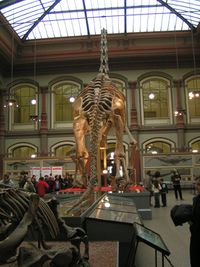
. . . . . . . . . . . . . . . . . . . . . . . . . . . . . . . . . . . . . . . . . . . . . . . . . . . . . . . . . . . . . . . . . . . . . . . . . . . . . . . . . . . . . . . . . . . . . . . . . . . . . . . . . . . . . . . . . . . . . . . . . . . . . . . . . . . . . . . . . . . . . . . . . . . . . . . . . . . . . . . . . . . . . . . .
مشاهير الخريجيين، الأساتذة والمحاضرين
Albert Einstein, theoretical physicist known for developing the theory of relativity and recipient of the Nobel Prize in Physics
Erwin Schrödinger, physicist who developed a number of fundamental results in quantum theory, recipient of the Nobel Prize in Physics
Max Planck, theoretical physicist and originator of quantum theory, recipient of the Nobel Prize in Physics
Max von Laue, physicist and recipient of the Nobel Prize in Physics
Paul Ehrlich, physician known for curing syphilis and recipient of the Nobel Prize in Physiology or Medicine
Albrecht Kossel, biochemist who pioneered in the study of genetics and recipient of the Nobel Prize for Physiology or Medicine
Jacobus Henricus van 't Hoff, pioneering chemist and the first winner of the Nobel Prize in Chemistry
Otto Hahn, chemist, pioneer in the fields of radioactivity and radiochemistry, and recipient of the Nobel Prize for Chemistry
Robert Koch, physician and microbiologist, discoverer of anthrax, tuberculosis and cholera bacillus
Rudolf Virchow, physician anthropologist, pathologist, prehistorian, biologist, father of modern pathology
Theodor Mommsen, classical scholar and recipient of the Nobel Prize in Literature
Alfred Wegener, polar researcher and geophysicist who originated the continental drift hypothesis
Werner Heisenberg, theoretical physicist and pioneer of quantum mechanics
Karl Weierstrass, mathematician, considered "the father of modern analysis"
Jakob and Wilhelm Grimm, best-known collectors of German and European folk tales
Heinrich Heine, poet best known for his early lyric poetry
Yeshayahu Leibowitz, public intellectual, scientist, and writer
Karl Marx, philosopher, political theorist, and socialist revolutionary
Friedrich Engels, philosopher and revolutionary socialist
Angela Davis, political activist, philosopher
Georg Wilhelm Friedrich Hegel, idealist philosopher and one of the fundamental figures of modern Western philosophy
Johann Gottlieb Fichte, philosopher, German idealist
Walter Benjamin, philosopher, cultural critic and essayist
Max Stirner, philosopher and forerunner of nihilism and postmodernism
Ernst Cassirer, idealist philosopher
Arthur Schopenhauer, philosopher
Leopold von Ranke, historian, founder of modern source-based history
Barthold Georg Niebuhr, historian, statesman, banker, father of modern scholarly historiography
Felix Mendelssohn, composer during the early Romantic period
Max Weber, sociologist and influential figure in modern social theory and social research
Georg Simmel, sociologist and philosopher
W.E.B. Du Bois, civil rights activist and academic
Karl Liebknecht, socialist politician and revolutionary
Gustav Stresemann, statesman during the Weimar Republic and recipient of the Nobel Peace Prize
Austen Chamberlain, statesman and recipient of the Nobel Peace Prize
Gregor Gysi, politician, former President of the Party of the European Left, leader of the Left Party (Germany)
Dietrich Bonhoeffer, theologian, pastor, anti-Nazi dissident, founder of the Confessing Church
Friedrich Schleiermacher, theologian, philosopher, biblical scholar, considered the "Father of Modern Protestant theology"
Emmanuelle Charpentier, professor and recipient of the Nobel Prize in Chemistry
Benedykt Dybowski, professor of Zoology, pioneer of Limnology
- Theodore Dyke Acland (1851-1931)، جراح وطبيب
- Alexander Altmann (1906–1987)، حاخام وباحث فلسفة يهودية
- Gerhard Anschütz (1908- ) leading jurisprudent and "father of the constitution" of the Bundesland Hesse
- ميتشل باتشلت (1951- )، طبيب أطفال وعالم أوبئة، رئيس جمهورية تشيلي
- عزمي بشارة (1956- )، سياسي فلسطيني من عرب إسرائيل
- Bruno Bauer (1809–1882)، عالم لاهوت، ناقد الكتاب المقدس، وفيلسوف
- Jurek Becker (1937–1997)، كاتب (Jacob the Liar)
- Eliezer Berkovits (1908-1992)، حاخام، فيلسوف، وعالم لاهوت
- اوتو فون بسمارك (1815–1898)، أول مستشار لألمانيا
- Dietrich Bonhoeffer (1906–1945)، عالم لاهوت ومقاتل
- ماكس بورن (1882–1970)، فيزيائي، وحائز جائزة نوبل في الفيزياء عام 1954
- Gottlieb Burckhardt (1836-1907)، طبيب نفسي، وأول طبيب نفسي يقوم بجراحة نفسية معاصرة (1888)
- Michael C. Burda، عالم اقتصاد كلي
- George C. Butte (1877-1940)، مشرع أمريكي
- Stepan Shahumyan (1878-1918)، سياسي اشتراكي، ورئيس كميون باكو
- Azriel Carlebach (1909–56)، صحفي وكاتب إسرائيلي
- Ernst Cassirer (1874–1945)، فيلسوف
- أدلبرت فون شاميسو (1781–1838)، عالم طبيعة وكاتب
- زاكر حسين (1897-1969)، ثالث رؤساء الهند[20]
- Wilhelm Dilthey (1833–1911)، فيلسوف
- و.إ.ب. دو بويس (1868–1963)، ناشط وباحث أمريكي-أفريقي
- پول إرليخ (1854–1915)، طبيب، حائز جائزة نوبل في الطلب عام 1908
- ألبرت أينشتاين (1879–1955)، فيزيائي وحائز جائزة نوبل في الفيزياء عام 1921
- فردريك إنگلز (1820–1895)، صحفي وفيلسوف
- Ludwig Andreas Feuerbach (1804–1872)، فيلسوف
- يوهان گوتليب فيشته (1762–1814)، فيلسوف، عميد الجامعة (1810-1812)
- هرمان إميل فيشر (1852–1919)، مؤسس علم الكيمياء الحيوية، حائز جائزة نوبل في الفيزياء عام 1902
- ڤرنر فورسمان (1904–1979)، فيزيائي، حائز جائزة نوبل في الطب عام 1956
- جيمس فرانك (1882–1964)، فيزيائي، حائز جائزة نوبل في الفيزياء عام 1925
- Ernst Gehrcke (1878–1960)، فيزيائي تجريبي
- ياكوب گريم (1785–1863)، عالم لسانيات وناقد أدبي
- ڤيلهلم گريم (1786–1859)، عالم لسانيات وناقد أدبي
- فريتس هابر (1868–1934)، كيميائي، حائز جائزة نوبل في الكيمياء عام 1918
- اوتو هان (1879–1968)، كيميائي، حائز جائزة نوبل في الكيمياء عام 1944
- [[William Reginald Halliday|سير وليام رينالد هادليداي (1886–1966)، رئيس كينگز كولدج لندن (1928–1952)
- Robert Havemann (1910–1982)، كيميائي، شريك-مؤسس الاتحاد الاوروپي، وزعيم منشق ألماني
- گيورگ ڤيلهلم فريدريش هيگل (1770–1831)، فيلسوف
- هاينرش هاينه (1797–1856)، كاتب وشاعر
- ڤرنر هايزنبرگ (1901–1976)، فيزيائي، حائز جائزة نوبل في الفيزياء عام 1932
- هرمان فون هلمهولتس (1821–1894)، طبيب وفيزيائي
- گوستاڤ هرتس (1887–1975)، فيزيائي، حائز جائزة نوبل في الفيزياء عام 1925
- هاينريش هرتس (1857–1894)، فيزيائي
- Abraham Joshua Heschel (1907–1972) حاخام، فيلسوف، عالم لاهوت
- Jacobus Henricus van 't Hoff (1852–1911)، كيميائي، حائز جائزة في الكيمياء عام 1901
- Max Huber (1874–1960)، محامي دولي ودبلوماسي
- Christoph Wilhelm Hufeland (1762–1836)، عالم ماكروبيوتيك
- ڤيلهلم فون همبولت (1767–1835)، سياسي، عالم لسانيات، مؤسس الجامعة
- ألكسندر فون هومبولت (1769–1859)، عالم طبيعة
- Jane Ising (1902- )، اقتصادي
- Hermann Kasack (1896–1966)، كاتب
- George F. Kennan (1904–2005)، دبلوماسي أمريكي، عالم سياسي ومؤرخ
- Gustav Kirchhoff (1824–1887)، فيزيائي
- روبرت كوخ (1843–1910)، فيزيائي، حائز جائزة نوبل في الطب عام 1905
- ألبركت كوسل (1853–1927)، فيزيائي، حائز جائزة نوبل في الطلب عام 1910
- Arnold Kutzinski (ت. 1956)، طبيب نفسي
- Arnold von Lasaulx (1839–1886) mineralogist and petrographer
- ماكس فون لاوه (1879–1960)، فيزيائي، حائز جائزة نوبل في الفيزياء عام 1914
- Yeshayahu Leibowitz (1903–94)، مفكر وموسوعي إسرائيلي
- فاسيلي ليونتييف (1905–1999)، اقتصادي، حائز جائزة نوبل في الاقتصاد عام 1973
- كارل ليبكنخت (1871–1919)، سياسي اجتماعي وثائر
- Friedrich Loeffler (1852–1915)، عالم أحياء دقيقة
- Herbert Marcuse (1898–1979)، فيلسوف
- كارل ماركس (1818–1883)، فيلسوف
- Ernst Mayr (1904–2005)، عالم أحياء
- Lise Meitner (1878–1968)، فيزيائي حائز جائزة إنريكو فرمي عام 1966
- فليكس مندلسون بارتولدي (1809–1847)، مؤلف موسيقي
- تيودور مومسن (1817–1903)، مؤرخ، حائز جائزة نوبل في الأدب عام 1902
- إدموند مونتگمري (1835-1911)، فيلسوف، عالم، طبيب
- ماكس پلانك (1858–1947)، فيزيائي، حائز جائزة نوبل عام 1918
- Leopold von Ranke (1795–1886)، مؤرخ
- Robert Remak (1815–1865)، عالم أحياء الخلية
- Friedrich Wilhelm Joseph von Schelling (1775–1854)، فيلسوف
- Friedrich Daniel Ernst Schleiermacher (1768–1834)، فيلسوف
- Bernhard Schlink (1944- )، كاتب، Der Vorleser (القارئ)
- Carl Schmitt (1888-1985)، فقيه، منظر سياسي، وأستاذ قانون ألماني
- Menachem Mendel Schneerson (1902–1994)، حاخام، فيلسوف، وعالم لاهوت
- آرثر شوپنهاور (1788–1860)، فيلسوف
- إرڤن شرودنگر (1887–1961)، فيزيائي وحائز جائزة نوبل في الفيزياء عام 1933
- گيورگ سيمل (1858–1918)، فيلسوف وعالم اجتماع
- Joseph B. Soloveitchik (1903–1993)، حاخام، فيلسوف، عالم لاهوت
- Herman Smith-Johannsen (1875-1987)، رياضي طرح التزحلق عبر البلاد في أمريكا الشمالية
- Werner Sombart (1863–1941)، فيلسوف، عالم اجتماع، واقتصادي
- هانز شپمان (1869–1941)، عالم أحياء، حائز جائزة نوبل في العلوم عام 1935
- Max Stirner (1806–1856)، فيلسوف
- Yemima Tchernovitz-Avidar (1909-98)، مؤلف إسرائيلي
- Gustav Tornier (1859–1938)، عالم حفريات وعالم حيوان
- Kurt Tucholsky (1890–1935)، كاتب وصحفي
- Rudolf Virchow (1821–1902)، فيزيائي وسياسي
- ألفرد ڤگنر (1880–1930)، عالم، جيولوجي، عالم أرصاد جوية، منظر مبكر لنظرية "الجرف القاري"
- Karl Weierstraß (1815–1897)، رياضياتي
- Wilhelm Heinrich Westphal (1882–1978)، فيزيائي
- ڤيلهلم ڤين (1864–1928)، فيزيائي، حائز جائزة نوبل في الفيزياء عام 1911
- Ulrich von Wilamowitz-Moellendorff (1848–1931)، لغوي
- ريتشارد ڤيلشتاتر (1872–1942)، كيميائي، حائز جائزة نوبل في الكيمياء عام 1915
- Komitas Vardapet (1869–1935)، راهب أمريكي، مؤلف موسيقي، مغني
يوجد 40 حائز لجائزة نوبل من خريجي الجامعة:
- 1901 ياكوبوس هنريكوس ڤانت هوف (الكيمياء)
- 1901 إميل ڤون برنگ (الفسيولوجيا أو الطب)
- 1902 هرمان إميل فيشر (الكيمياء)
- 1902 تيودور مومسن (الأدب)
- 1905 أدولف فون باير (الكيمياء)
- 1905 روبرت كوخ (الفسيولوجيا أو الطب)
- 1907 ألبرت أبراهام ميكلسون (الفيزياء)
- 1907 إدوارد بوخنر (الكيمياء)
- 1908 پول إرليخ (الفسيولوجيا أو الطب)
- 1909 كارل فرديناند براون (الفيزياء)
- 1910 اوتو ڤلاخ (الكيمياء)
- 1910 ألبركت كوسل (الفسيولوجيا أو الطب)
- 1910 پول يوهان لودڤيگ فون هيسه (الأداب)
- 1911 ڤيلهلم ڤين (الفيزياء)
- 1914 ماكس فون لاوه (الفيزياء)
- 1915 ريتشارد ڤيلشتاتر (الكيمياء)
- 1918 فريتس هابر (الكيمياء)
- 1918 ماكس پلانك (الفيزياء)
- 1920 ڤالتر نرنست (الكيمياء)
- 1921 ألبرت أينشتاين (الفيزياء)
- 1925 گوستاڤ لودڤيگ هرتس (الفيزياء)
- 1925 جيمس فرانك (الفيزياء)
- 1925 ريتشارد أدولف زيگموندي (الكيمياء)
- 1928 أدولف ڤينداوس (الكيمياء)
- 1929 هانز ڤون اويلر-تشلپين (الكيمياء)
- 1931 اوتو هاينريش ڤاربورگ (الفسيولوجيا أو الطب)
- 1932 ڤرنر هايزنبرگ (الفيزياء)
- 1933 إرڤن شرودنگر (الفيزياء)
- 1935 هانز شپمان (الفسيولوجيا أو الطب)
- 1936 پيتر دباي (الكيمياء)
- 1939 أدولف بوتنانت (الكيمياء)
- 1944 اوتو هان (الكيمياء)
- 1950 كورت ألدر (الكيمياء)
- 1950 اوتو ديلز (الكيمياء)
- 1953 فريتس ليپمان (الفسيولوجيا أو الطب)
- 1953 هانز أدولف كربس (الفسيولوجيا أو الطب)
- 1954 ماكس بورن (فيزيائي)
- 1956 والتر براتين (الفيزياء)
- 1991 برت ساكمان (الفسيولوجيا أو الطب)
- 2007 گرهارد إرتل (الكيمياء)
التصنيفات الدولية
عام 2011 كان ترتيب كيو إس ترتيب جامعات العالم[21] لجامعة هومبولت رقم 132 على مستوى العالم، رقم 6 في ألمانيا. وكانت ترتيباتها: رقم 27 في الفنون والإنسانيات، رقم 186 في الهندسة وتكنولوجيا المعلومات، 65 في علوم الحياة والطب الحيوي، 49 في العلوم الطبيعية، و59 في العلوم الاجتماعية.
انظر أيضاً
- قائمة الجامعات الأوروپية المعاصرة (1801–1945)
- قائمة جامعات برلين
- Charité
- الجامعة الحرة في برلين
- الجامعة التكنولوجيا في برلين
- Hertie School of Governance
- جامعة برلين للفنون
- متحف هومبولت
المصادر
- ^ أ ب ت Langner, Stefanie. "Man beruft eben tüchtige Männer und läßt die Universität sich allmählich encadrieren — Humboldt-Universität zu Berlin". www.hu-berlin.de.[dead link]
- ^ "Leistungsbericht über das Jahr 2020 zur Umsetzung des Hochschulvertrags 2018 – 2022" (PDF) (in الألمانية). Senate Chancellery of Berlin. p. 27. Retrieved 18 April 2022.
- ^ أ ب ت "Facts and Figures". Humboldt University of Berlin. Retrieved 15 June 2017.
- ^ أ ب ت "Humboldt-Universität zu Berlin". Archived from the original on 3 December 2013. Retrieved 2 December 2013.
- ^ أ ب List of Nobel laureates by university affiliation
- ^ design. "Hausfarben der Humboldt-Universität". Humboldt-Universität zu Berlin (in الألمانية). Retrieved 7 October 2022.
- ^ "Humboldt University of Berlin – university, Berlin, Germany". Encyclopedia Britannica.
- ^ During that period, it was also unofficially called Universität unter den Linden after its location in the former palace of Prince Henry of Prussia which his brother, King Frederick II, had built for him between 1748 and 1753 on the avenue Unter den Linden.
- ^ أ ب "Berlin's oldest university faces new challenges as it turns 200". Deutsche Welle. 15 October 2010.
- ^ hu_adm. "Daten und Zahlen zur Humboldt-Universität — Humboldt-Universität zu Berlin". www.hu-berlin.de (in الألمانية). Retrieved 11 January 2018.
- ^ Connell Helen, University Research Management Meeting the Institutional Challenge: Meeting the Institutional Challenge, p. 137, OECD, 2005, ISBN 9789264017450
- ^ Hans C. Ohanian, Einstein's Mistakes: The Human Failings of Genius, p. 156, W. W. Norton & Company, 2009, ISBN 9780393070422
- ^ Humboldt-Universität (in German) Landesdenkmalamt Berlin
- ^ ladenbea. "Die Attikaskulpturen". Humboldt-Universität zu Berlin (in الألمانية). Retrieved 11 February 2023.
- ^ temp_adm. "Short History — Humboldt-Universität zu Berlin". www.hu-berlin.de.
- ^ أ ب Nolte, Dorothee (12 October 2009). "200 Jahre Humboldt-Uni: Der Ort: Ein Palais Unter den Linden" – via Die Zeit.
- ^ Benedict Anderson (1991). Imagined Communities. New York City & London: Verso Books. p. 194. ISBN 0-86091-329-5.
- ^ Mclellan, David (1981). Karl Marx: A Biography (Fourth ed.). Palgrave Macmillan. p. 15.
- ^ Rüegg 2004, pp. 4–6
- ^ http://en.wikipedia.org/wiki/Zakir_Hussain_(politician)
- ^ http://www.topuniversities.com/university-rankings/world-university-rankings/2011?page=2
. . . . . . . . . . . . . . . . . . . . . . . . . . . . . . . . . . . . . . . . . . . . . . . . . . . . . . . . . . . . . . . . . . . . . . . . . . . . . . . . . . . . . . . . . . . . . . . . . . . . . . . . . . . . . . . . . . . . . . . . . . . . . . . . . . . . . . . . . . . . . . . . . . . . . . . . . . . . . . . . . . . . . . . .
وصلات خارجية
- Humboldt University of Berlin website (بالألمانية) (إنگليزية)
52°31′05″N 13°23′36″E / 52.51806°N 13.39333°E{{#coordinates:}}: لا يمكن أن يكون هناك أكثر من وسم أساسي واحد لكل صفحة
- Pages using gadget WikiMiniAtlas
- Articles with dead external links from January 2023
- CS1 الألمانية-language sources (de)
- Articles containing ألمانية-language text
- صفحات ذات وسوم إحداثيات غير صحيحة
- Coordinates on Wikidata
- Articles using infobox university
- Pages using infobox university with the affiliations parameter
- Pages using Lang-xx templates
- Articles with hatnote templates targeting a nonexistent page
- جامعة هومبولت في برلين
- جامعات برلين
- جامعات ألمانية
- مؤسسات تعليمية تأسست في 1810
- جامعات حكومية
- Buildings and structures in Mitte
